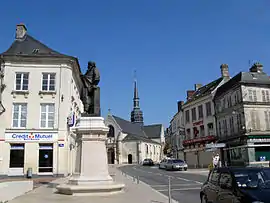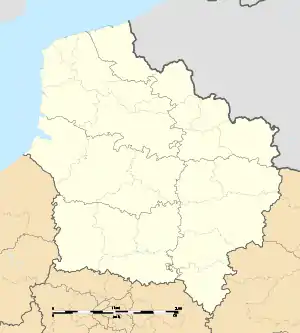Villers-Cotterêts
Villers-Cotterêts (pronounced [vilɛʁ kɔt(ə)ʁɛ]) is a commune in the Aisne department in Hauts-de-France, France.
Villers-Cotterêts | |
|---|---|
 Main square with a statue of Alexandre Dumas and church | |
.svg.png.webp) Coat of arms | |
Location of Villers-Cotterêts 
| |
 Villers-Cotterêts  Villers-Cotterêts | |
| Coordinates: 49°15′36″N 3°05′26″E | |
| Country | France |
| Region | Hauts-de-France |
| Department | Aisne |
| Arrondissement | Soissons |
| Canton | Villers-Cotterêts |
| Government | |
| • Mayor (2020–2026) | Franck Briffaut (RN) |
| Area 1 | 41.71 km2 (16.10 sq mi) |
| Population (2017-01-01)[1] | 10,872 |
| • Density | 260/km2 (680/sq mi) |
| Time zone | UTC+01:00 (CET) |
| • Summer (DST) | UTC+02:00 (CEST) |
| INSEE/Postal code | 02810 /02600 |
| Elevation | 65–226 m (213–741 ft) (avg. 120 m or 390 ft) |
| 1 French Land Register data, which excludes lakes, ponds, glaciers > 1 km2 (0.386 sq mi or 247 acres) and river estuaries. | |
Geography
It is located 80 km (50 mi) NE of Paris via the RN2 facing Laon. Its nickname Petite villa sur la côte de Retz means Little villa by the coast of Retz, as the town is situated next to the Forest of Retz, which covers 130 km2 (50 sq mi) of land.
History
Villers-Cotterêts is famous because of the Ordinance of Villers-Cotterêts of 1539 signed by king Francis I of France ('François Ier'), which made French the official language in the kingdom instead of regional languages like Occitan or the elite European lingua franca of the time, Latin.
In 1914, the British Expeditionary Force fought a rearguard action here during the Retreat from Mons. On 1 September, the British 4th (Guards) Brigade who were covering the withdrawal of 2nd Division, came into contact with the leading units of the German III Corps on the edge of woodland near Villers-Cotterêts. The brigade lost more than 300 men in the encounter, but were able to break away and continue the withdrawal.[2] Many are buried at Guards' Grave, a military cemetery maintained by the Commonwealth War Graves Commission.[3]
La Plaine Saint-Rémy, Pisseleux, was an ancient commune that was merged with Villers-Cotterêts in 1971.
Gallery
 The 16th century Château de Noüe
The 16th century Château de Noüe One of the very decorated staircases of the castle where King Francis I signed the Ordinance of Villers-Cotterêts.
One of the very decorated staircases of the castle where King Francis I signed the Ordinance of Villers-Cotterêts. Villers-Cotterêts town hall
Villers-Cotterêts town hall
Population
| Year | Pop. | ±% |
|---|---|---|
| 1793 | 2,400 | — |
| 1800 | 2,327 | −3.0% |
| 1806 | 2,273 | −2.3% |
| 1821 | 2,543 | +11.9% |
| 1831 | 2,688 | +5.7% |
| 1836 | 2,692 | +0.1% |
| 1841 | 3,481 | +29.3% |
| 1846 | 3,465 | −0.5% |
| 1851 | 3,602 | +4.0% |
| 1856 | 2,609 | −27.6% |
| 1861 | 2,764 | +5.9% |
| 1866 | 3,396 | +22.9% |
| 1872 | 3,119 | −8.2% |
| 1876 | 3,206 | +2.8% |
| 1881 | 3,811 | +18.9% |
| 1886 | 3,790 | −0.6% |
| 1891 | 4,582 | +20.9% |
| 1896 | 4,772 | +4.1% |
| 1901 | 4,981 | +4.4% |
| 1906 | 5,381 | +8.0% |
| 1911 | 5,654 | +5.1% |
| 1921 | 4,208 | −25.6% |
| 1926 | 4,610 | +9.6% |
| 1931 | 4,612 | +0.0% |
| 1936 | 5,070 | +9.9% |
| 1946 | 3,607 | −28.9% |
| 1954 | 3,917 | +8.6% |
| 1962 | 5,489 | +40.1% |
| 1968 | 6,313 | +15.0% |
| 1975 | 8,949 | +41.8% |
| 1982 | 8,380 | −6.4% |
| 1990 | 8,867 | +5.8% |
| 1999 | 9,834 | +10.9% |
| 2008 | 10,168 | +3.4% |
| 2012 | 10,669 | +4.9% |
The inhabitants are called Cottevreziens.
Notable natives and residents
- Charles Baur (1929–2015), Mayor of Villers-Cotterêts (1953–1989), President of the Regional Council of Picardy (1976–1978, 1985–2004)[4]
- Alexandre Dumas, père (1802–1870), popular novelist, was born and grew up here.
Sports
The town was the start of Stage 4 in the 2007 Tour de France.
Sights
The original château was built around 950 AD and was burnt to the ground twice before being rebuilt out of stone in the early 12th century. The front entrance is the only original remaining structure, which is listed with the Historic Monument Registry at the École des Beaux Arts. Francis I purchased the château from the de Noüe family to house his mistress Anne de Pisseleu d'Heilly. The Château de Noüe was updated with 18th-century régence decoration by Gilles-Marie Oppenordt. The current owner is the Pépinières du Valois, an agricultural venture.
The city opened, at the beginning of the 20th century, a Museum Alexandre Dumas to gather souvenirs about this family.
See also
References
- "Populations légales 2017". INSEE. Retrieved 6 January 2020.
- Mons 1914: the BEF's Tactical Triumph by David Lomas and Ed Dovey, Osprey Publishing, 1997 p.85
- "CWGC - Cemetery Details". Commonwealth War Graves Commission. Retrieved 16 June 2012.
- Alberts, Jennifer (2015-01-05). "Charles Baur, emblématique président du Conseil Régional de Picardie, est décédé". France 3. Retrieved 2015-01-29.
External links
| Wikimedia Commons has media related to Villers-Cotterêts. |
- Tourist office website (in French)
- Historic society of Villers-Cotterêts (in French)
- The Catholic Encyclopedia entry on Gilles-Marie Oppenordt